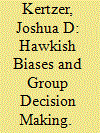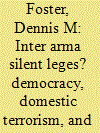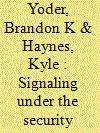|
|
|
Sort Order |
|
|
|
Items / Page
|
|
|
|
|
|
|
| Srl | Item |
| 1 |
ID:
156929


|
|
|
|
|
| Summary/Abstract |
This article analyzes how foreign policy is made in the Islamic Republic of Iran. To do so, it analyzes the role of various state institutions, factions, and individuals in the formulation and conduct of foreign policy. Actual powers of various institutions in Iran have evolved greatly since 1979. The history and causes of such institutional changes are discussed briefly. Iran is not a one-man dictatorship. Rather, it is ruled by an oligarchy comprised of fundamentalist Shia clerics and lay fundamentalists. The ruling elite is composed of competing factions such as hard-liners, expedients, and reformists, as well as sub-factions such as pragmatic hard-liners and ultra-hard-liners. The oligarchy is deeply divided on many issues, including on foreign policy. This article presents, in great detail, the views and policy proposals of the top members of the oligarchy regarding Iran's nuclear program, relations with the U.S., and Iran's regional policies. Finally, this article applies the findings of this research to the case of Iran's nuclear program. Evidence shows that Iran has had a clandestine nuclear weapons program. This article analyzes the ruling oligarchy's responses to the global reaction to Iran's nuclear program.
|
|
|
|
|
|
|
|
|
|
|
|
|
|
|
|
| 2 |
ID:
186591


|
|
|
|
|
| Summary/Abstract |
How do cognitive biases relevant to foreign policy decision making aggregate in groups? Many tendencies identified in the behavioral decision-making literature—such as reactive devaluation, the intentionality bias, and risk seeking in the domain of losses—have been linked to hawkishness in foreign policy choices, potentially increasing the risk of conflict, but how these “hawkish biases” operate in the small-group contexts in which foreign policy decisions are often made is unknown. We field three large-scale group experiments to test how these biases aggregate in groups. We find that groups are just as susceptible as individuals to these canonical biases, with neither hierarchical nor horizontal group decision-making structures significantly attenuating the magnitude of bias. Moreover, diverse groups perform similarly to more homogeneous ones, exhibiting similar degrees of bias and marginally increased risk of dissension. These results suggest that at least with these types of biases, the “aggregation problem” may be less problematic for psychological theories in international relations than some critics have argued. This has important implications for understanding foreign policy decision making, the role of group processes, and the behavioral revolution in international relations.
|
|
|
|
|
|
|
|
|
|
|
|
|
|
|
|
| 3 |
ID:
142491


|
|
|
|
|
| Summary/Abstract |
This article provides empirical evidence showing that when a multilevel government is well coordinated, organized crime can be more effectively controlled. Using a time-variant data set of Mexico’s cocaine markets at the subnational level and Cox proportional-hazards regressions, I show that when Mexico’s democratization decreased the probability of government coordination—the same party governing a municipality at every level of government—drug traffickers were more likely to violate the long-standing informal prohibition on selling cocaine within the country. It was this decrease in government coordination that would set the conditions for a violent war between drug cartels to erupt in the mid-2000s.
|
|
|
|
|
|
|
|
|
|
|
|
|
|
|
|
| 4 |
ID:
154738


|
|
|
|
|
| Summary/Abstract |
This article develops expectations about the use of military force by democracies facing domestic terrorism. Due to the necessity of balancing effective counterterrorism with liberal acceptability, domestic terrorism typically represents a significant but nonexistential threat to democracies that is ineradicable via repression; as such, it is likely to generate appreciable diversionary incentives. Moreover, the use of force abroad, coupled with counterterrorist strategies that seek to safeguard democratic legitimacy, allows leaders to provide benefits both to citizens who seek retribution against terrorists and to those who value the preservation of liberty. Tests of the correlates of dispute initiation across all democracies, 1970–2000, provide support for this hypothesis. Further analyses reveal that diversion from domestic terrorism is most likely by democratic governments with relatively greater diversionary capacity and with lesser repressive capacity and incentive.
|
|
|
|
|
|
|
|
|
|
|
|
|
|
|
|
| 5 |
ID:
114025


|
|
|
|
|
| Publication |
2012.
|
| Summary/Abstract |
This study examines the decision-making process of the George W. Bush administration which led to the decision in late 2006 to order the Iraq troop surge. The study analyzes whether the bureaucratic politics model of foreign policy decision making can accurately explain the events of the case. The study seeks to further test the explanatory power and descriptive accuracy of the bureaucratic politics model, while also attaining a more textured, academic understanding of the decision-making process leading to the Iraq troop surge. The decision to order the troop surge in Iraq is one of the more important decisions in post-9/11 U.S. foreign policy and continues to impact U.S. strategy in Iraq, Afghanistan, and overall military doctrine. Finally, the author endeavors to contribute to the further development and refinement of the bureaucratic politics model of foreign policy decision making.
|
|
|
|
|
|
|
|
|
|
|
|
|
|
|
|
| 6 |
ID:
190754


|
|
|
|
|
| Summary/Abstract |
Can an individual impact a phenomenon as overwhelming and complex as war? Do leaders impact interstate war dynamics? Leaders high in grandiose narcissism focus their efforts on maintaining their inflated self-image during war by striving desperately for victory. While most leaders sacrifice their historical image for state interests, more narcissistic leaders only exit wars if they “win”, or overcome threats to their self-image. Narcissists essentially ignore revealed information and create deadlock to avoid looking like losers. In other words, narcissistic leaders encourage us to look beyond traditional rationalist models of wartime dynamics. This paper analyzes United States’ interstate war duration from 1897 to 2007 and finds support for the argument that more narcissistic United States presidents extend war duration. This paper also compares Eisenhower’s handling of the Korean War and Nixon’s handling of the Vietnam War as an illustrative probe of causal mechanisms.
|
|
|
|
|
|
|
|
|
|
|
|
|
|
|
|
| 7 |
ID:
178206


|
|
|
|
|
| Summary/Abstract |
One of the most intractable debates in IR revolves around the severity and frequency of the security dilemma. Offensive realists argue that states are compelled to make worst-case assumptions about each other’s intentions, which yields inexorable competition and conflict even between mutually-benign actors. Yet others have argued that rational benign states should always be able to find cooperative signals that are costly enough to be credible, but not too costly to risk sending. If true, this should alleviate the security dilemma and facilitate cooperation, even under high initial distrust. However, there is little empirical work on interstate reassurance and the conditions under which mutually-benign actors can build trust. We address this gap using laboratory experiments to test Andrew Kydd’s canonical model of the security dilemma. We find strong support for the directional effects of the hypothesized signaling mechanisms. However, the frequency of cooperation is significantly lower than the model predicts, and the feasibility of reassurance is highly sensitive to the degree of prior trust. This implies that although reassurance can mitigate the security dilemma, offensive realism may still capture important psychological mechanisms that impede interstate cooperation.
|
|
|
|
|
|
|
|
|
|
|
|
|
|
|
|
|
|
|
|
|